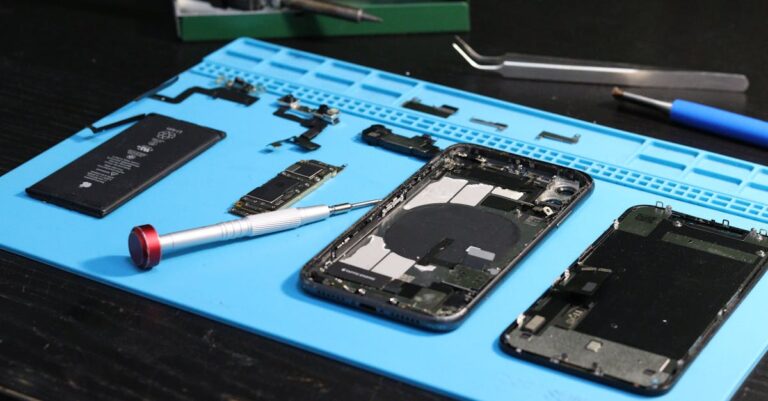In a world where gadgets rule and appliances have personalities, choosing a career in consumer electronics might just be the best decision since someone invented the remote control. With technology evolving faster than a smartphone can update, this field offers not just job stability but also the thrill of being at the forefront of innovation.
Imagine waking up each day excited to tackle the latest tech trends, all while helping people navigate their digital lives. Whether it’s selling the newest smart fridge or repairing that stubborn tablet, a career in consumer electronics is anything but dull. So, is it a good career path? Let’s dive in and explore why this electrifying industry could be the perfect fit for those ready to embrace the future.
Table of Contents
ToggleOverview of Consumer Electronics/Appliances Industry
The consumer electronics and appliances industry plays a vital role in modern life. Many individuals rely on various devices daily, from smartphones and laptops to refrigerators and washing machines. This industry’s continuous innovation ensures that technology evolves to meet consumer demands.
Networking within this sector opens numerous opportunities for career growth. That’s evident with a projected compound annual growth rate (CAGR) of approximately 9.2% from 2020 to 2027 for the global consumer electronics market. Job roles vary, including sales, engineering, technical support, and marketing, catering to diverse skill sets and interests.
The rise of smart technology has transformed this industry significantly. Smart homes, equipped with interconnected devices, create demand for skilled professionals. Their responsibility includes installation, troubleshooting, and customer support for these complex systems. Training and certifications in smart home technology can enhance employment prospects.
Additionally, sustainability has become a key focus. Companies increasingly prioritize energy-efficient appliances, resulting in niche markets for professionals specializing in green technology. Sustainability initiatives align with consumer preferences, reflecting a growing trend in eco-friendly products.
Many consumers value personalization and tailored experiences when choosing electronics. Professionals who understand customer needs and can recommend suitable products excel in this competitive environment. Thus, strong communication skills are essential for success in sales and customer service.
Collaborating with global suppliers and manufacturers also offers exposure to international markets. Understanding different cultures and consumer behaviors can provide a competitive advantage. Overall, pursuing a career in the consumer electronics and appliances industry presents promising opportunities for growth and development.
Career Opportunities in Consumer Electronics/Appliances
The consumer electronics and appliances industry offers diverse and exciting career opportunities due to its continuous growth and innovation. Professionals in this field can find various pathways to explore their skills and passions.
Roles and Responsibilities
Sales associates engage with customers, guiding them in selecting the right products. Engineers focus on designing and developing new technologies that enhance user experiences. Technical support specialists troubleshoot issues, ensuring customer satisfaction through effective problem-solving. Marketing professionals create strategies to promote products, capturing consumer interest through targeted campaigns. Each role plays a crucial part in driving business success within the industry.
Job Market Trends
A compound annual growth rate of 9.2% from 2020 to 2027 indicates significant job market potential in consumer electronics and appliances. Demand for skilled professionals continues growing, especially in smart technology installation and customer support. Sustainability also shapes market trends, driving interest in energy-efficient products and creating niche roles for experts in green technology. Overall, the job market presents a wealth of opportunities for those pursuing careers in this dynamic sector.
Skills Required for Success
A career in consumer electronics and appliances demands a blend of technical and soft skills. Professionals thrive in this field by mastering specific competencies that align with industry needs.
Technical Skills
Proficiency in operating systems, hardware, and software related to consumer electronics is crucial. Understanding electronics fundamentals and troubleshooting techniques minimizes downtime for customers. Familiarity with smart technology enhances a professional’s ability to assist clients effectively. Knowledge of energy-efficient appliances and sustainable practices appeals to environmentally conscious consumers. Familiarity with digital marketing tools and platforms can also provide a competitive edge in promotions. Professionals often embrace ongoing training opportunities to stay ahead of innovations and trends in the sector.
Soft Skills
Strong communication abilities help professionals connect with customers and colleagues. Active listening ensures they understand customer needs and concerns. Problem-solving skills prove essential when addressing technical issues or customer inquiries. Adaptability allows individuals to respond to the fast-paced changes within the industry effectively. Team collaboration fosters an environment of support and innovation among coworkers. Empathy toward customers helps professionals provide personalized solutions, enhancing customer satisfaction and loyalty. Ultimately, these soft skills significantly contribute to a successful career in consumer electronics and appliances.
Benefits of a Career in Consumer Electronics/Appliances
A career in consumer electronics and appliances offers numerous advantages. Professionals in this sector enjoy diverse opportunities that cater to various skill sets and passions.
Job Stability
Job stability remains a significant benefit in the consumer electronics sector. The industry experiences consistent demand as technology evolves, and consumers continually seek the latest devices. A projected compound annual growth rate (CAGR) of approximately 9.2% from 2020 to 2027 supports this trend. Job roles encompass various functions, including sales, engineering, and technical support. Companies thrive due to the need for innovative solutions, ensuring employees experience long-term career prospects. Each role contributes to overall job security, fostering a sense of stability in an ever-changing landscape.
Growth Potential
Growth potential in consumer electronics and appliances is considerable. The rise of smart technology creates vast opportunities for skilled professionals. As interconnected devices reshape consumer behavior, demand for installation, troubleshooting, and customer support increases. Industry trends highlight openings in smart home technology and sustainable practices. Professionals who embrace ongoing training enhance their marketability and positions within the sector. Successfully navigating these developments leads to career advancement and increased earning potential. The dynamic nature of the industry allows individuals to adapt and grow alongside technological innovations.
Challenges in the Industry
Challenges exist within the consumer electronics and appliances industry, requiring adaptability and resilience.
Market Competition
Market competition remains fierce in the consumer electronics industry. Companies continuously strive for market share, often leading to price wars that can affect profitability. New entrants frequently emerge, pushing established brands to innovate or enhance their offerings. Staying relevant demands constant monitoring of competitors and consumer preferences. Professionals need to differentiate themselves with unique selling points, whether through superior customer service, specialized knowledge, or innovative marketing strategies.
Technological Changes
Technological changes shape the consumer electronics landscape rapidly. With a projected compound annual growth rate of 9.2%, the quick pace of innovation presents both opportunities and uncertainties. Professionals must keep current with emerging technologies, such as AI, IoT, and smart home devices, to remain competitive. Frequent updates to regulations and standards also require ongoing learning and skill development. Adapting to these changes proves essential for individuals aiming to succeed in a dynamic environment.
A career in consumer electronics and appliances offers a blend of excitement and stability in a fast-paced environment. With the industry’s projected growth and the increasing demand for smart technology and sustainable practices, professionals have ample opportunities to thrive.
By honing both technical and soft skills, individuals can position themselves for success and stand out in a competitive market. The continuous evolution of technology ensures that those who embrace ongoing learning will find their efforts rewarded.
Ultimately, this sector not only provides job security but also the chance to make a meaningful impact by helping consumers navigate their digital lives.



